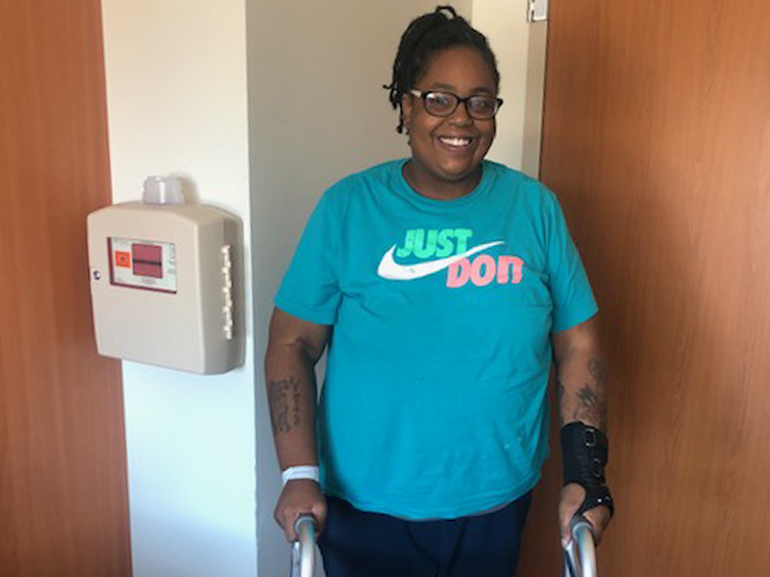Sarah's story

Sarah Robinson, 32, is a home health aide from Cincinnati who loves swimming, researching history, discussing current events, playing video games and spending time with family. She has been married to her wife, Krissy since 2018 and they have two young sons and a rescue dog, Bella. Sarah takes a lot of pride in her work, saying, “My grandmother was a stroke victim, so I’ve always enjoyed helping do things for people that can’t do all things for themselves and providing companionship.” Sarah is used to being a caregiver to others, but recently she found herself in need of help.
She was driving her sons to their first day of school when she felt a heaviness in her arm. After dropping them off, she returned home and noticed the whole left side of her body felt strange, including tingling in her left leg. Thinking she just needed some sleep, Sarah took a nap. Once she got up, she noticed Bella was acting strange and wouldn’t leave her side. Becoming concerned, Sarah called Krissy, who told her to call her doctor. At the urging of her doctor, Sarah called 911 and she was transported to TriHealth Good Samaritan Hospital where they performed a CT scan and confirmed a stroke. Sarah spent five days in the acute care hospital before transferring to TriHealth Rehabilitation Hospital to continue her recovery.
When Sarah arrived for inpatient rehabilitation, she was unable to control the left side of her body, struggled with balance and had muscle weakness. Sarah also found that she was repeating herself often, stuttering and unable to think clearly.
These impairments affected Sarah’s ability to safely perform self-care activities and mobility tasks, so she began a regiment of physical, occupational and speech therapy. She also set goals for herself. “I wanted to be able to walk again, use the restroom, shower and do every day activities on my own,” said Sarah.
In physical therapy, she worked on aerobic conditioning and endurance, balance and walking using a body weight support system. This ensured Sarah remained safe from falls and helped support some of her body weight until she regained strength. “I got better each day,” said Sarah. “I was able to walk 100 feet without assistance; that gave me hope that I was getting back to where I want to be."
Occupational therapists helped Sarah practice daily living activities. Due to her limited standing balance and left-sided coordination challenges, therapists provided her with adaptive equipment, such as a tub transfer bench to use in the hospital and when she returned home. They also provided patient and family education, so Krissy would be prepared to help Sarah.
In her speech therapy sessions, therapists taught Sarah how to use external memory aides, like phone apps, for medication and finance management. They also worked on improving her memory skills when recalling information such as her daily routines and overall health so she could take care of herself while Krissy was at work. Therapists used an evidence-based treatment for working memory, similar to a card game where patients practice recalling colors, numbers, etc. Sarah also used the Bioness Integrated Therapy System, a touchscreen display with software programs, to improve her reaction time, which would allow her to begin driving again.
Sarah’s family and friends provided a great deal of support throughout her recovery journey. Krissy was constantly visiting and bringing Sarah anything she needed. She was in touch with her kids regularly through video chats, where they danced to keep her spirits high. Sarah also shared how her social media network shared encouraging words and prayers to help keep her motivated.
After 11 days, able to walk more than 150 feet using a rolling walker and perform daily living skills, Sarah returned home to her family. She most looked forward to sleeping in her own bed, spending quality time with her family and getting back to her hobbies. Sarah said, “I’m looking forward to my new lifestyle and journey. I am starting off with home therapy and eventually going to go to outpatient therapy.”